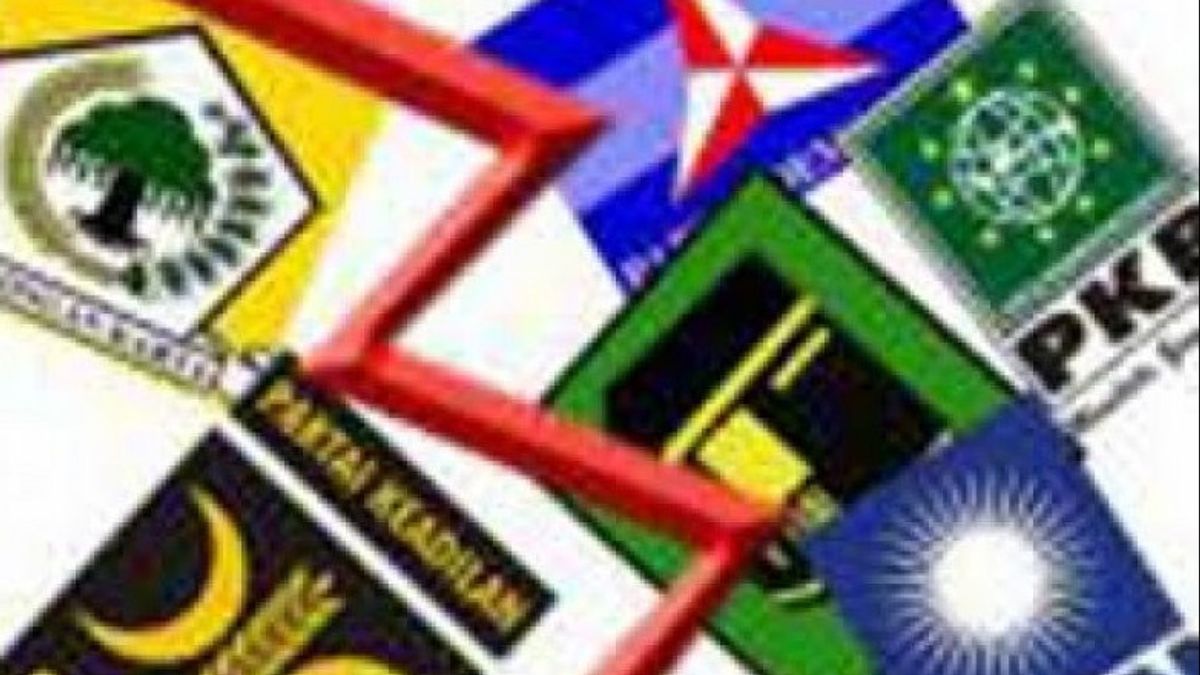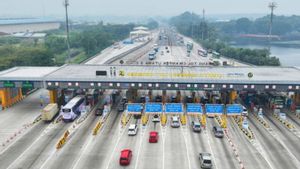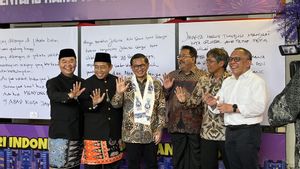JAKARTA - The discourse of a coalition of mass-based Muslim political parties (Islamic political parties) has recently surfaced in the midst of the country's political universe.
Coalitions of Islamic political parties are said to be an alternative in the 2024 Presidential Election amid the current "power" of nationalist parties.
Reporting from Antara, Sunday, April 25, the meeting between the elite United Development Party (PPP) and the Prosperous Justice Party (PKS) in mid-April, triggered the emergence of this central axis coalition discourse.
DPP PKS Secretary General Aboe Bakar Al-Habsy and DPP PPP Secretary General Arwani Thomafi agree that the opportunity to explore a coalition of Islamic parties is open.
The discourse raised by the two Islamic party elites was also greeted positively by the Chairperson of the Bulan Bintang Party (PBB) Yusril Ihza Mahendra.
The UN, according to Yusril, supports this discourse and is ready to be actively involved in further meetings in the future.
Since then, the discourse has grown and has drawn responses from a number of figures.
The development of Islamic political parties occurred rapidly during the reform era. Therefore, before talking further about the discourse of a coalition of Islamic parties, it is better if we understand the development of the Islamic party itself in the reform era.
Political researcher of the Indonesian Institute of Sciences (LIPI) Lili Romli in one of her journals which can be read on the page ejournal.politik.lipi.go.id said that there are several factors that explain the phenomenon of the establishment of Islamic political parties in the post-New Order era, namely theological factors. , historical, sociological, and reform factors.
1. Theological factorsIn this view, religion is something that is integrated, which is inseparably united with politics. Islam is din wa daulah.
Based on this, social problems, including state or political matters, are an inseparable part of religious matters. As a manifestation of this viewpoint is the need for political power.
This power is needed in an effort to implement Islamic law, Islamic laws, both civil and criminal. In this context, a political party is needed to fight for and enforce Islamic law.
Thus, the establishment of an Islamic political party is a calling and embodiment of the theological view of the relationship between religion and the state.
2. Sociological factorsIslam in Indonesia is the majority religion. Its adherents make up about 90 percent of the total population of Indonesia which reaches around 200 million people.
With such a majority, it is appropriate to channel political aspirations in accordance with Islamic values and struggles. In this context, Islamic political parties are considered as channels for channeling the aspirations of the Islamic struggle.
In this regard, the establishment of an Islamic political party is an inevitable necessity. This is because sociologically, Muslims in Indonesia are followers of the majority and they will feel comfortable and safe if the channeling of political aspirations is conveyed through Islamic political parties.
This sociological context seems to be used by Islamic political elites to establish Islamic political parties. With the majority of Muslims, of course it will automatically receive support from Muslims.
Therefore, the existence of Islamic political parties will automatically be supported by Muslims. Moreover, coupled with a theological perspective, where the need for a means of struggle to realize Islamic aspirations. With this context, sociological and theological factors meet, complement and support one another.
3. Historical factorsIn the history of Indonesia, Islam was a force that played a major role in the resistance against the colonialists. Islam at that time was one of the front guards in driving out colonialism.
In order to expel colonialism, an organizational tool is needed to unite aspirations and goals. So it was noted the establishment of Sarekat Islam (SI), the first organization of political forces with the most members among other movement organizations.
4. The reform factorThe reforms spearheaded by the students in overthrowing the New Order regime gave birth to an era of freedom.
In this era, every group or group is given the opportunity to channel or form political parties according to their political principles and aspirations. Political elites, including the Islamic political elite, did not seem to waste this opportunity to establish political parties.
The four historical factors in the establishment of Islamic parties in the reform era mentioned by Lili Romli, may be the basis and objective of the discourse of the coalition of Islamic parties initiated by the PPP and PKS elites, including Yusril.
But of course there is always a pragmatic side to politics. From this point of view, each coalition is triggered to gather strength, at least in meeting the Presidential Threshold nomination threshold, as well as the calculation of political support to win the Presidential Election.
The main objective of participating in the Presidential Election is victory to gain power, so that political parties can implement their vision and mission to improve the welfare of the people and build the nation and state.
Alternative or counterproductiveThe big question that should be asked about the discourse of a coalition of Islamic political parties is whether the coalition is an alternative or is it counterproductive in the current situation.
A coalition of Islamic parties can certainly be an alternative. This is because since the last several Presidential Elections, the domination of coalition determination of political parties is still "controlled" by the nationalist parties.
But on the other hand, this coalition can also be counterproductive, as stated by the General Chairperson of the National Mandate Party (PAN), Zulkifli Hasan, who assessed that the discourse of forming a coalition of Islamic mass-based political parties for the 2024 Election would be counterproductive to the efforts of all parties to carry out national reconciliation.
The deputy chairman of the MPR RI considered this discourse to be counterproductive to efforts to strengthen and strengthen unity and integrity as a nation and state.
He reminded that in the 2019 Presidential Election, the emergence of ethnic, religious, racial and intergroup (SARA) sentiments, flow politics, and identity politics was so strong.
According to Zulkifli, the "wounds" and trauma caused by the tension and tug of war are still felt, because the people are still divided, even though the elite quickly unites, as shown by the joining of the presidential and vice presidential candidates who are political opponents of the winning pairs in the cabinet.
Zulkifli assessed that the discourse of a coalition of Islamic parties in 2024 would actually strengthen flow politics in Indonesia, even though this is something that must be avoided.
Zulkifli's statement can be concluded that PAN rejects the coalition of Islamic parties.
Zulkifli explained that what PAN is currently doing is fighting for and strengthening the politics of ideas, namely politics that prioritizes concepts and programs for the welfare of the people, realizing the idea of equality, formulating ideas about sovereignty, and so on.
The PAN idea of Islam according to him is substantial Islam, middle Islam (wasathiyah), Islamic teachings which are translated into various dimensions of life. The idea of Islam that is rahmatan lil 'alamin, or in the language that Buya Hamka often speaks, is Islam of salt, content and substance, not lipstick Islam.
On the other hand, Deputy IV of the Presidential Staff Office, Jury Ardiantoro, said that regardless of the pros and cons of the coalition of Islamic parties, the discourse of the coalition is legitimate from a democratic side.
All citizens, groups, especially political parties in Indonesia are free to express their political will, as long as it does not conflict with the basis of the state and the law in Indonesia.
According to the jury, as identity, a coalition of Islamic political parties or other religions is fine, as long as it is within the corridors of the Republic of Indonesia.
So how can we prevent a legitimate alternative discourse from the side of democracy from becoming counterproductive?
The Indonesian Institute's Research and Program Manager, Arfianto Purbolaksono, reminded that the discourse of forming a coalition of Islamic Political Parties, should not sell identity politics, because it will further create worries about the division of society.
Moreover, according to him, if you look at the condition of the people who have not fully "recovered" from the division after the 2017 DKI Jakarta Regional Election to date.
Arfianto said that in the midst of a divided society, it was time for political parties to play a role as a unifying nation, no longer using identity sentiments as a means to fulfill their interests alone.
If the discourse is to be realized, he proposes to prioritize clear ideas about future programs that are in line with the needs of the people.
He reminded that the idea of change from political parties and coalitions of political parties is very important because reflecting on previous elections, political parties only prioritize the popularity of figures and are dry about new ideas that are offered about change.
He assessed that a coalition of Islamic parties must equalize the footing of Indonesia in the future so that the coalition that is built is preceded by an understanding of that foundation.
According to him, the similarity of views is then formulated into a coalition commitment which is then outlined in the vision and mission, as well as programs, in the context of bringing forward the presidential and vice presidential candidates.
In addition, in carrying out the presidential and cawapres candidates, a breakthrough is needed to avoid splits between the coalition, for example, an option is to hold a convention mechanism.
The convention can be aimed at the best cadres from each internal Islamic political party itself, not from figures outside the party who only take advantage of Islamic political parties.
The implementation of a convention must also be followed by the quality of its management, prioritizing transparency and accountability in its implementation, to avoid money politics or "entrusted" presidential and vice presidential candidates.
Based on the description above, we can certainly draw conclusions. The idea of a coalition of Islamic parties is a valid idea from the aspect of democracy and can be an alternative in the 2024 presidential election.
However, this discourse can be counterproductive if it does not pay attention to the principles of national unity and integrity, especially if it is only carried out to pursue ambition and power alone without any fresh ideas accompanying it.
The English, Chinese, Japanese, Arabic, and French versions are automatically generated by the AI. So there may still be inaccuracies in translating, please always see Indonesian as our main language. (system supported by DigitalSiber.id)













